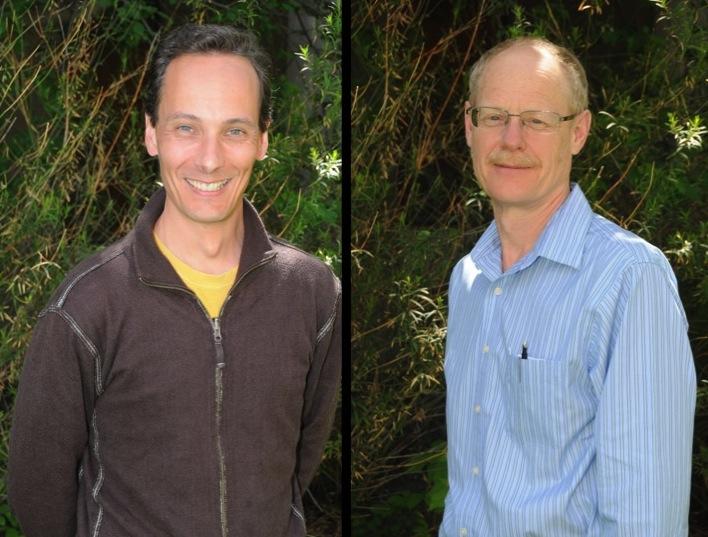Aug. 25, 2014
Biology instructors employ new teaching strategies

C-LAB participants Bill Huddleston (left) and Rob Edwards.
David Bininda, University of Calgary
Bill Huddleston, an instructor in the Department of Biological Science, teaches large introductory biology courses. This fall he’s going to explore strategies that could help his students do better on exams in areas that have traditionally given them difficulty.
“The students I have in BIOL 241 are typically new to university and in their first term of school,” Huddleston explains. “Some of these students struggle with the course content, especially the areas requiring them to understand and apply mathematic principles. I’m interested in giving my students tools beyond memorization that allow them to recognize how well they know a topic and help them solve topic-related problems.”
Huddleston will create a tutorial showing students how to read, analyze and answer questions related to a topic, and give them practice problem sets to work through before the exam. Then he will determine how often students access the tutorial and compare its use to exam scores on questions related to the topic. “I’ll also examine whether the use of the tutorial has any effect on students’ perceptions of the course in relation to provided support materials,” Huddleston adds.
Rob Edwards, a senior instructor in biological sciences, is teaching BCEM 403, a third-year biochemistry course in winter 2015. In this course, students learn laboratory techniques for purifying and characterizing proteins. Many BCEM 403 students expect to do research projects the following year and the course teaches the principles and develops the skills for that work.
“This year, rather than focusing solely on learning lab techniques, I want my students to have the opportunity to ask a scientific question, design and carry out experiments to answer that question, and then interpret and report the results,” says Edwards. “Students will work in teams on experimental projects, which will model those done by pharmaceutical companies in a drug-screening program.”
“I’m hoping this teaching strategy, which uses authentic science questions, will enhance my students’ teamwork skills, motivation to learn, and understanding of the scientific discovery process,” adds Edwards.
Both Huddleston and Edwards are participating in C-LAB (Classroom - Learn Assess Build), a Faculty of Science initiative giving academic staff the opportunity to conduct a teaching and learning research project involving a course they’re teaching. The program began in June with a three-day workshop for the ten participants.
Over the summer, participants meet in smaller groups with program staff to report on the progress of their research projects as well as give and receive feedback on their ideas and discuss any challenges they may be encountering during the design phase.
This article is part of a series profiling C-LAB participants and their teaching research projects.

